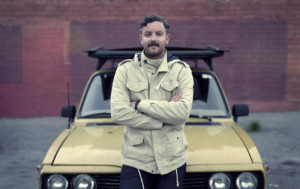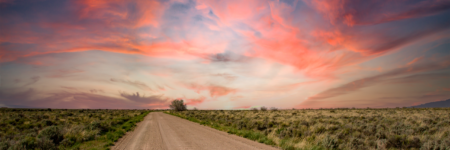Colin Anderson was having a sleepless night. His client, actor Seth Rogen, was eager to begin production on an upcoming podcast, but Anderson, Sirius XM’s VP of Comedy Podcasts, hadn’t yet found a producer for the project. “I was racking my brain for who to bring in,” he recalls.
If Rogen had been interested in producing the standard celebrity-chums-it-up-with-his-famous-buddies chat show, Anderson’s search would have been relatively straightforward. But Rogen wanted to create something more complex: a storytelling show in which his friends’ most incredible life experiences were transformed into “something bigger”—something more like an action-adventure or comedy film for the ear.
“I was looking for weirdness and talent and cinematic ambition. I had a list of four or five names. The candidates were mostly public radio producers, and obviously, I love that, but I run a comedy network. I don’t want a public radio sense of humor, I want an actual sense of humor,” Anderson tells me with a laugh.
The executive considered pressing his in-house team into service, but they were slammed with other assignments, and anyway, Rogen wanted to work with someone who could be 100 percent dedicated to his project. Complicating matters, Rogen was due to be back on a film set in six weeks. Anderson had to move fast.

As the VP continued to toss and turn, he made a screwball culinary connection between a film Rogen had starred in the previous year, and the work of an independent creator named Richard Parks III. Parks had become known in audio circles for creating Richard’s Famous Food Podcast (RFFP), a psychedelic, satirical, and completely off-the-wall food documentary show that featured a mustachioed pickle as a central character. Coincidentally, Rogen had been cast as a man preserved in a tank of pickles in the 2020 comedy-drama An American Pickle. “So it was just this pickle thing, this pickle connection,” Anderson says cheerfully. “I was like—Richard, of course! It’s a match made in heaven.”
The podcast executive had been aware of RFFP for quite some time, as the show’s cartoon-like soundscape, eccentric fictional characters, and earwormy audio tics had become a popular topic of conversation among his peers and fellow audiophiles. Additionally, Anderson got a closer look at the show when—cue the irony—Parks had pitched him on adding it to Stitcher’s Earwolf Podcast Network. “When [Richard Parks] came in and pitched me, I thought, well, this is a remarkable thing, but I don’t think adding it to the network would do [the show] a great service,” Anderson says. “It’s just so weird; it felt like a podcast insiders’ podcast.”
But months later, it was that very weirdness that brought Parks’ name into the frame. According to Anderson, the creator stood out for many reasons, particularly his obvious documentary chops and knack for infusing “whimsy and fun” into his work. Anderson put Parks’ name at the top of his shortlist and informed Rogen that he might only need to speak with one person for the producer role.

A Zoom date was arranged and in a scene that could have appeared in one of Rogen’s bromance movies—or at least, I like to imagine it that way—the indie creator and the movie star connected on a creative level right away. “What I interpreted from [the meeting] was that Seth didn’t just want to chat with his buddies for an hour; he wanted to make something with craft,” recalls Parks. “He wanted to roll up his sleeves and spit on his hands and make a show. And he was very open to ideas.”
Parks says he left the meeting feeling like his and Rogen’s creative ambitions were “completely aligned.” This initial impression was further confirmed after Parks turned in his first assignment. He’d been tasked with editing and sound designing a rough cut of an early episode, in which comedian Paul Scheer recounts a disastrous childhood trip to Disneyland. About 10 minutes in, one of Rogen’s lines caught his ear: “Disney is like a drug for children.” Parks began singing and harmonizing the phrase “drugs for children” over a psychedelic rock library track.
“It felt risky. But I was like, this is me doing what I do. And I don’t want to feel like I have to hold back.”—Richard Parks
“I had gone into full-on, full-tilt, Richard’s Famous psychedelia,” admits Parks of the session. “It felt risky. But I was like, this is me doing what I do. And I don’t want to feel like I have to hold back.” Parks cut the song into the piece and sent it over to Rogen for some early feedback.
The risk paid off. Parks recalls that the actor was “immediately very effusively happy” with the clip (later, Anderson confirms with me that Rogen “flipped out and said ‘this is exactly what I want.’”) Parks tells me that the response “established a symbiotic relationship instantly because doing something like this is hard, interpersonally. It’s like being in a band, when you’re collaborating this closely. That’s kind of been our creative dynamic and it’s been a dream come true.”
Storytime with Seth Rogen launched in October of this year, to a positive reception from critics and listeners alike (even industry insiders, notoriously resentful of a perceived celebrity takeover within podcasting, had to admit that the show showed an admirable level of craft). In a review for the Financial Times Fiona Sturges wrote that “[what] separates it from the usual celebrity-hosted pods is the quirky production, courtesy of Richard Parks III.” Similarly, Vulture’s Nick Quah pointed out Rogen’s show had benefited from Parks’ “quick editing, archival tape, and psychedelic sound loops.”
Producers are rarely mentioned by name within podcast reviews; instead it’s the hosts, especially the famous ones, who typically receive the accolades, so the critics’ recognition of Parks’ contributions is especially notable. After reviewing the glowing headlines—and hearing the numerous times Rogen himself refers to Parks as “wonderful” and “amazing” during episodes of the show—one could easily come away thinking that Parks is as significant a part of the show’s success as its celebrity host.
As it turns out, when Parks describes his working relationship to Rogen, he compares it to the dynamic you might see between an impresario and frontman. “I help present him; I make sure that there aren’t any pieces of lint on his collar before he goes out and does his thing,” he explains. “That’s what a strong-handed producer can do. He can bring vision and specificity. If you add that to an already strong foundation—which is a very smart, interested and curious person who is asking good questions—you have the type of thing that is a movie star and a producer.”
“The place you get to with the work, and what is rewarding in a purely experiential, emotional, spiritual way, is always the thing.”—Richard Parks
When I ask Parks whether working on Rogen’s show feels at all similar to creating RFFP, he says that in “several major ways” it is completely different, but in both projects, “the place you get to with the work, and what is rewarding in a purely experiential, emotional, spiritual way, is always the thing.”
As I speak with Parks, it’s clear that this idea of mentally losing yourself in your work is as crucial to him as the work itself; in essence, one can’t exist without the other. That said, he acknowledges that it can be a struggle to find your way into a purely creative mindset. His father, accomplished musician Van Dyke Parks, calls this “doing the work that gets you to the work” and Parks believes that it’s an integral part of any creative endeavor. “That’s what the work is: [getting past] the bullshit that you have to do in order to do what you do.”
I ask him whether he sees the podcast industry’s emphasis on various metrics such as downloads and follows as part of the “bullshit” he has to get past. “When you start thinking about how to grow the audience and let that dictate what you do, I feel that’s dangerous,” he says. “That is a situation that I personally am very allergic to. I do end up there a lot of the time, but when I recognize it, I try to get out of there.”
Instead, Parks says that, particularly with RFFP, he has tried to focus on challenging himself creatively with the work, almost one-upping himself each time he sits down to create the thing. “I do not care about success by the sort of typical definitions of success. I just really enjoy doing it.”
Admittedly, financial considerations aren’t always something a creator can disregard, however it turns out that RFFP wasn’t conceived as a money-making endeavor (over the years, Parks has supported himself in myriad ways including writing for magazines, filmmaking, authoring books, and acting in TV commercials). The podcast was—and still is—a passion project. Inherently, this has freed Park to create the show however the hell he wants.
And that, right there, may be the most underplayed secret of making great work—be it within audio or any other artistic medium. If you are lucky enough to be able to carve out a small creative space, free of expectations, paychecks, and deadlines—hey, it took Parks over two years to produce episode two of his show—perhaps you’ll discover what you’re really capable of. And if you’re lucky, maybe a famous movie star will also notice.
Season one of Storytime with Seth Rogen is available now; season two arrives in 2022. Richard’s Famous Food Podcast will return with new episodes in 2022.




Comments